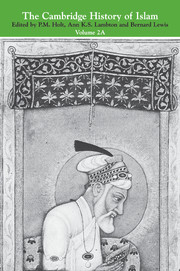Book contents
- Frontmatter
- Introduction
- Part V The Indian sub-continent
- 1 MUSLIM INDIA BEFORE THE MUGHALS
- 2 INDIA UNDER THE MUGHALS
- APPENDIX THE SULTANATES OF THE DECCAN, SIXTEENTH TO EIGHTEENTH CENTURIES
- 3 THE BREAKDOWN OF TRADITIONAL SOCIETY
- 4 INDIA AND PAKISTAN
- Part VI SOUTH-EAST ASIA
- Part VII AFRICA AND THE MUSLIM WEST
- Bibliography
- References
2 - INDIA UNDER THE MUGHALS
from Part V - The Indian sub-continent
Published online by Cambridge University Press: 28 March 2008
- Frontmatter
- Introduction
- Part V The Indian sub-continent
- 1 MUSLIM INDIA BEFORE THE MUGHALS
- 2 INDIA UNDER THE MUGHALS
- APPENDIX THE SULTANATES OF THE DECCAN, SIXTEENTH TO EIGHTEENTH CENTURIES
- 3 THE BREAKDOWN OF TRADITIONAL SOCIETY
- 4 INDIA AND PAKISTAN
- Part VI SOUTH-EAST ASIA
- Part VII AFRICA AND THE MUSLIM WEST
- Bibliography
- References
Summary
Bābur
A Timurid prince, ‘Umar Shaykh Mīrzā, ruler of Farghānā, died in 899/1494, leaving little more than a title to his principality for his son Bābur, then eleven years old. Bābur had to fight not only to defend Farghānā but also to fulfil his ambition of possessing Samarqand because of its prestige as the main city of Central Asia. His adventures described in his excellent memoirs read like a romance. He did succeed in occupying Samarqand, only to lose it again. His lasting possession proved to be Kābul which he occupied in 910/1504, and which became his headquarters. All else, including Farghānā, he lost in the struggle.
The rise of the Özbegs and the Safavids affected Bābur's career deeply. The Özbegs were able to extinguish the power of the Timurids because they proved incapable of serious and joint effort. The Safavids came into conflict with the Özbegs and defeated them. Bäbur was restored to the kingdom of Samarqand as a vassal of Shāh Ismā‘īl I after the defeat and death of Muhammad Shaybānī Khān Özbeg (917/1511). The Safavids were defeated in the battle of Ghujduwān, and Bābur lost all hope of ruling Samarqand, and returned to Kābul (918/1512). When Bābur felt secure, his mind turned towards India. Ibrāhīm Lodī, the sultan of Delhi, had alienated his nobles. Dawlat Khān, the governor of Lahore, sent messengers to Kābul offering allegiance in return for help. Ibrāhām's uncle, ‘Ālam Khān, also went to Kābul seeking assistance to capture the throne of Delhi.
- Type
- Chapter
- Information
- The Cambridge History of Islam , pp. 35 - 63Publisher: Cambridge University PressPrint publication year: 1977



